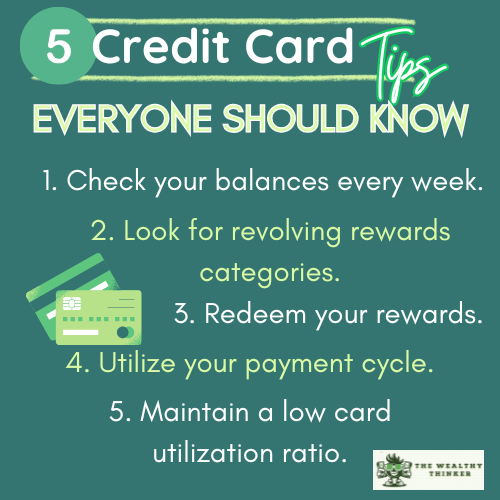Credit cards can be a useful financial tool.
They can help you better manage your spending, establish a positive credit history, and receive extra cash for things you already buy. But when you’re new to using them, they can be daunting.
Credit card debt in the US is at an all-time high, at a whopping $1.21 trillion as of end of Q4 2024, with the average card debt among those carrying unpaid balances coming in at $7,236.
With so many people racking up more debt on their cards, going back to basics on how best to keep you out of a debt hole is a necessary practice.
Here are a few credit card tips to make the most of your credit cards without accidentally driving yourself into debt.

9 Credit Card Tips Everyone Should Know
1. Have a budget.
A credit card should never be used to purchase anything that you cannot afford.
You can avoid going into debt by having a realistic idea of how much you can spend and pay off at the end of the month.
Use a budget like the 50/30/20 strategy, which recommends allocating 50% of your take-home salary to basics like housing and groceries, 30% or less to products you like but don’t need, and 20% or more to savings and debt repayment.
This can help you stay on track with your credit card spending in relation to your income and other savings and spending goals.
2. Check your balances every week.
The advantage of using a credit card over cash is that it is much easier to keep track of your spending.
When you use your credit card, though, your purchases are always recorded. All you have to do is get into your account and look through your expenses. This is unlike paying for items with bills which are difficult to track, especially if you don’t have receipts.
Checking your credit card balances on a weekly basis is a smart idea. That may sound excessive, but if you follow this advice, you’ll be less likely to overspend and accumulate a debt you can’t pay off.
3. Look for revolving rewards categories.
It’s not uncommon for credit cards to provide different perks, such as cashback on purchases.
However, some cards provide rotating rewards categories, which allow you to earn additional points for particular purchases at various periods of the year. It’s also smart to take advantage of these opportunities when they come up.
Consider this scenario: one of your credit cards regularly gives 1% cashback on all transactions, but during the first quarter of the year, it offers 5% cashback on hardware store purchases.
You’ll earn additional money merely by utilizing that specific rewards card when you’re remodeling and stocking up on supplies. (But don’t do it if you don’t need them, of course!)
4. Ask for a credit limit increase once your income rises.
Having a greater credit limit will not only allow you to spend more, but it can also help you maintain a good credit score.
Credit card utilization is a key element used in determining your credit ratings. As a result, the higher the credit card limit you qualify for, the easier it will be to maintain a low utilization rate.
This is why it is advisable to request a higher limit when your income rises, as this would bring down your utilization ratio and boost your credit score if you maintain a low usage rate.
Note: Only do this if you are consistently not carrying a balance. Continuing to raise your limit and NOT paying down your credit card debt will land you in an ever-deeper hole.)
5. Redeem your rewards.
Although some credit cards provide benefits that never expire, this is not always the case.
Read the small print of your rewards program carefully, and if there are any incentives that have an expiration date, make a note of it on your calendar. You won’t be able to refuse the benefits you’ve earned this way.
6. Utilize your payment cycle.
The law allows a 21-day grace period to pay off your bill after the payment cycle closes.
However, you don’t have to wait till it gets to that. Paying off your debt as soon as possible reduces interest rates.
It also tells the lenders that you are fiscally responsible and can be trusted with more money (additional loans, higher credit limit, etc.).
Before you take out debt, try to figure out how you intend to pay first. Only then should you take a loan. If you borrow without having a clear plan on how to pay it back, you may be digging yourself into a hole later on.
Treat your card like cash. Only buy what you can afford when you can afford it, and pay it off on time, every time.
7. Protect your identity.
One of the best credit card tips is to always protect your identity and other valid information about your card.
This means every time you use your card to shop online you have to be conscious of what type of information you may be giving out.
Take the time to change your passwords and login information on sites you frequently use and don’t use the same one on all of them.
If you really must write down passwords, keep your password journal safely locked away at home, not on your desk or phone. When it comes to phones, don’t keep automatic login information for banking or shopping sites on them.
If it’s stolen, a hacker may quickly crack your phone password, if you have one, and gain access to your accounts. If you’re going to give out credit card information over the phone, do so in a secure area away from outsiders.
8. Always request for a chargeback if appropriate.
In the case that illegal transactions are made on your card, a chargeback is simply a return from your credit card provider.
Check to see if your card provides this level of protection and that you may contact your provider at any moment to have your account frozen if required.
If you have to, don’t be afraid to file a chargeback request – the merchant may not appreciate it, but it’s your money on the line.
9. Maintain a low card utilization ratio.
The second most important factor in your credit history is your credit utilization ratio.
This is how much of your credit limit you’re using.
For example, if your credit card limit is $5,000 and you are carrying a $3,500 balance, your credit utilization ratio is 70%. The higher it is, the worse it is, because you’re reaching the top of your limit.
It might be tempting to exhaust your credit limit, especially as you have the opportunity of paying it back later.
However, this is something you should avoid. Carrying a significant credit card bill from month to month might harm your credit score.
Furthermore, it may provide the groundwork for accumulating credit card debt that may take a long time to repay.
Basic Credit Card Tips
Using a credit card wisely can help you build financial stability, earn rewards, and make the most of your purchases – without falling into debt.
By sticking to smart habits like budgeting, monitoring your spending, keeping your utilization low, and paying off your balance on time, you can use credit to your advantage rather than letting it become a burden.
The best credit card tips start with treating yours as a financial tool, not as an extension of your income.
Prioritizing responsible spending, protecting your information, and making strategic use of rewards will ensure that your credit card works for you, not against you.
With discipline and smart decision-making, you can enjoy the benefits of credit while safeguarding your financial future.
Photo by Obsahovka Obsahovka from Pexels
Editor’s note: This article was originally published Jan 7, 2022 and has been updated to reflect economic changes.



















